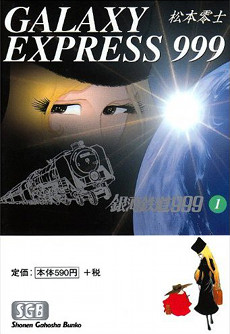Galaxy Express 999
| Galaxy Express 999 | |

Cover of the 1994 reprint of the first manga volume
|
|
|
銀河鉄道999 (Ginga Tetsudō Surī Nain) |
|
|---|---|
| Genre | Adventure, drama, space western |
| Manga | |
| Written by | Leiji Matsumoto |
| Published by | Shogakukan |
| English publisher | |
| Demographic | Shōnen, Seinen |
| Magazine | Manga-kun (1977–1979), Shōnen Big Comic (1979–1987), Weekly Young Sunday (1987) |
| English magazine | |
| Original run | January 24, 1977 – November 11, 1981 |
| Volumes | 18 |
| Anime television series | |
| Directed by | Nobutaka Nishizawa |
| Written by | Hiroyasu Yamaura Keisuke Fujikawa Yoshiaki Yoshida |
| Music by | Nozomi Aoki |
| Studio | Toei Animation |
| Licensed by | |
| Original network | Fuji TV, Animax |
| Original run | September 14, 1978 – March 26, 1981 |
| Episodes | 113 |
| Anime film | |
| Galaxy Express 999 | |
| Directed by | Rintaro |
| Written by | Shiro Ishimori |
| Music by | Yukihide Takekawa |
| Studio | Toei Animation |
| Licensed by | |
| Released | 1979 |
| Runtime | 130 minutes |
| Anime film | |
| Adieu Galaxy Express 999 | |
| Directed by | Rintaro |
| Written by | Shiro Ishimori |
| Music by | Osamu Shooji |
| Studio | Toei Animation |
| Licensed by | |
| Released | 1981 |
| Runtime | 130 minutes |
| Original video animation | |
| Galaxy Express 999: Eternal Fantasy | |
| Directed by | Konosuke Uda |
| Written by | Junki Takegami |
| Music by | Kohei Tanaka |
| Studio | Toei Animation |
| Licensed by | |
| Released | March 7, 1998 |
| Runtime | 60 minutes |
| Original video animation | |
| Maetel Legend | |
| Directed by | Kazuyoshi Yokota |
| Produced by | Takaji Matsudo |
| Written by | Leiji Matsumoto |
| Music by | Masamichi Amano |
| Studio | Vega Entertainment |
| Licensed by | U.S. Manga Corps (USA) |
| Released | 2000 |
| Runtime | 40 minutes (each) |
| Episodes | 2 |
| Anime television series | |
| Space Symphony Maetel | |
| Directed by | Shin'ichi Masaki |
| Produced by | Leiji Matsumoto |
| Written by | Mugi Kamio |
| Music by | Taro Hakase |
| Studio | Vega Entertainment |
| Original network | Animax (PPV Premier) |
| Original run | August 6, 2004 – June 20, 2005 |
| Episodes | 13 |
Galaxy Express 999 (銀河鉄道999(スリーナイン) Ginga Tetsudō Surī Nain?) is a manga written and drawn by Leiji Matsumoto, as well as various anime films and TV series based on it. It is set in a space-faring, high-tech future in which humans have learned how to transfer their minds and emotions with perfect fidelity into mechanical bodies, thus achieving practical immortality.
The manga won the Shogakukan Manga Award for shōnen in 1978. The anime series won the Animage Anime Grand Prix prize in 1981.
Matsumoto was inspired to create Galaxy Express 999 by the idea of a steam train running through the stars in the novel Night on the Galactic Railroad by Kenji Miyazawa.
An impoverished ten-year-old named Tetsuro Hoshino desperately wants an indestructible machine body, giving him the ability to live forever and have the freedom that the unmechanized don't have. While machine bodies are impossibly expensive, they are supposedly given away for free in the Andromeda galaxy, the end of the line for the Galaxy Express 999, a space train that only comes to Earth once a year.
The series begins with Tetsuro and his mother making their way to Megalopolis where they hope to get jobs to pay for passes for the 999. Along the way however, Count Mecha and a gang of "human hunters" kill Tetsuro's mother. Before she dies, she tells him to continue the journey they started, and to get a machine body to live the eternal life she couldn't. Tetsuro tries to forge on toward the city alone, but is quickly overcome by the brutal cold and wind. As he succumbs, he cries out an apology to his mother for failing to fulfill her wish, and hopes that in his next life he'll be born as a robot to begin with.
Tetsuro is surprised to awaken by the fireplace in the home of a beautiful woman, Maetel, who is the spitting image of his dead mother. Maetel tells him she had heard the entire incident with a long-range directional microphone she had been idly scanning around the area with. Maetel offers him an unlimited use pass for the 999 if he will be her traveling companion, to which Tetsuro agrees. She provides him with a gun and directs him to the Count's residence, telling him that the Count and his henchmen will be too distracted with their revelries to defend themselves against a surprise attack. Tetsuro bursts in on them in their meeting hall and cuts them down with a spray of gunfire. With the Earth police in hot pursuit, Tetsuro and Maetel flee the planet aboard the 999.
...
Wikipedia
